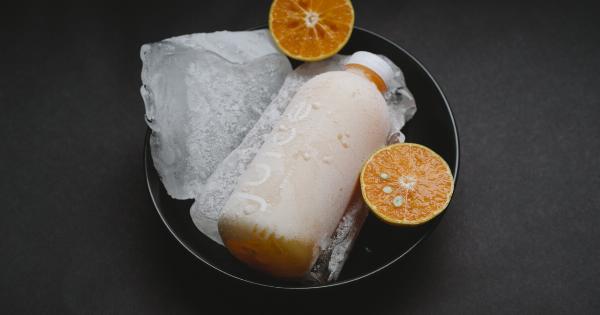Freezing is a great way to preserve food and extend its shelf life. However, not all foods are freezer-friendly. Some foods can lose their flavor, texture, and nutritional value when frozen, while others may become unsafe to eat.
To ensure you get the best out of your freezer, here are 15 foods you should avoid freezing:.
1. Fresh Fruits and Vegetables
While it may seem convenient to freeze fresh fruits and vegetables, their high water content and delicate cell structure make them prone to developing a mushy texture when thawed.
Instead, consider blanching vegetables before freezing, as this can help retain their color, flavor, and texture.
2. Leafy Greens
Leafy greens like lettuce, spinach, and kale do not fare well in the freezer. Freezing causes the cell walls to break down, resulting in a slimy and unappetizing texture.
It is best to consume leafy greens when they are fresh or opt for other preservation methods like canning or drying.
3. Eggs in Shells
Raw eggs should never be frozen in their shells. When eggs freeze, the liquid inside expands and can cause the shell to crack, leading to potential contamination.
If you want to freeze eggs, crack them into a freezer-safe container, beat them lightly, and then freeze.
4. Cream-Based Sauces
Cream-based sauces like Alfredo or béchamel tend to separate when frozen and thawed. Upon thawing, these sauces may become watery and lose their creamy consistency and flavor.
It is best to make these sauces fresh or store them in the refrigerator if you plan to consume them within a few days.
5. Mayonnaise
Mayonnaise contains eggs and oil, both of which can separate and become chunky when frozen. The texture and taste of mayonnaise will be significantly altered, rendering it inedible.
To maintain the quality of your mayo-based dishes, add the mayo after thawing or use alternatives like yogurt-based dressings.
6. Watery Fruits
Fruits with high water content, such as watermelon or citrus fruits, do not freeze well. Their cellular structure becomes damaged when frozen, resulting in a mushy and unpalatable texture.
Instead, consider making refreshing fruit salads or juices with these fruits when they are fresh.
7. Fried Foods
Fried foods lose their crispiness when frozen and thawed. The moisture trapped inside during freezing turns the coating soggy, leaving you with a disappointing texture.
To enjoy the best flavor and texture of fried foods, it is recommended to consume them immediately after cooking.
8. Soft Cheeses
Soft cheeses like brie, camembert, and goat cheese do not retain their original texture after freezing. The moisture content changes, and once thawed, these cheeses become crumbly, grainy, and may lose their distinctive flavors.
Stick to consuming soft cheeses within their recommended shelf life.
9. Yoghurt
Freezing yoghurt causes the texture to become grainy and separated. The live cultures in yoghurt may also die off, impacting its health benefits.
Instead, if you want to extend the shelf life of yoghurt, purchase it in smaller quantities or consider making your own.
10. Delicate Herbs
Freezing delicate herbs, like basil or cilantro, can alter their taste and texture. When thawed, these herbs tend to wilt, lose their vibrant color, and may taste less intense.
A better option is to chop herbs and mix them with oil or butter, freeze them in ice cube trays, and use as needed.
11. Cooked Pasta
Pasta, especially when cooked al dente, tends to lose its texture and become mushy when frozen and reheated. If you have leftover pasta, it is better to store it in the refrigerator and consume it within a couple of days rather than freezing it.
12. Canned Foods
Most canned goods are already designed to have a long shelf life at room temperature. Freezing these foods can adversely affect the texture and flavor.
Moreover, the contents of canned foods, like veggies or soups, may expand during freezing and cause the can to burst.
13. Whole Potatoes
Freezing whole potatoes causes their cell walls to rupture, resulting in a gritty and mushy texture. However, you can freeze mashed potatoes or parboiled potatoes successfully.
Ensure that mashed potatoes are stored in an airtight container to prevent freezer burn.
14. Coffee
Storing coffee in the freezer can sound appealing, but it can actually impact its flavor. Coffee beans or grounds easily absorb flavors and odors from the freezer, ultimately altering the taste of your brew.
It is best to store coffee in an airtight container at room temperature.
15. Carbonated Beverages
Carbonated beverages, including sodas and sparkling water, should never be frozen. The freezing process causes the carbonation to expand, leading to explosions or bursting cans.
It is advised to keep carbonated beverages in a cool, dry place instead of the freezer.






























